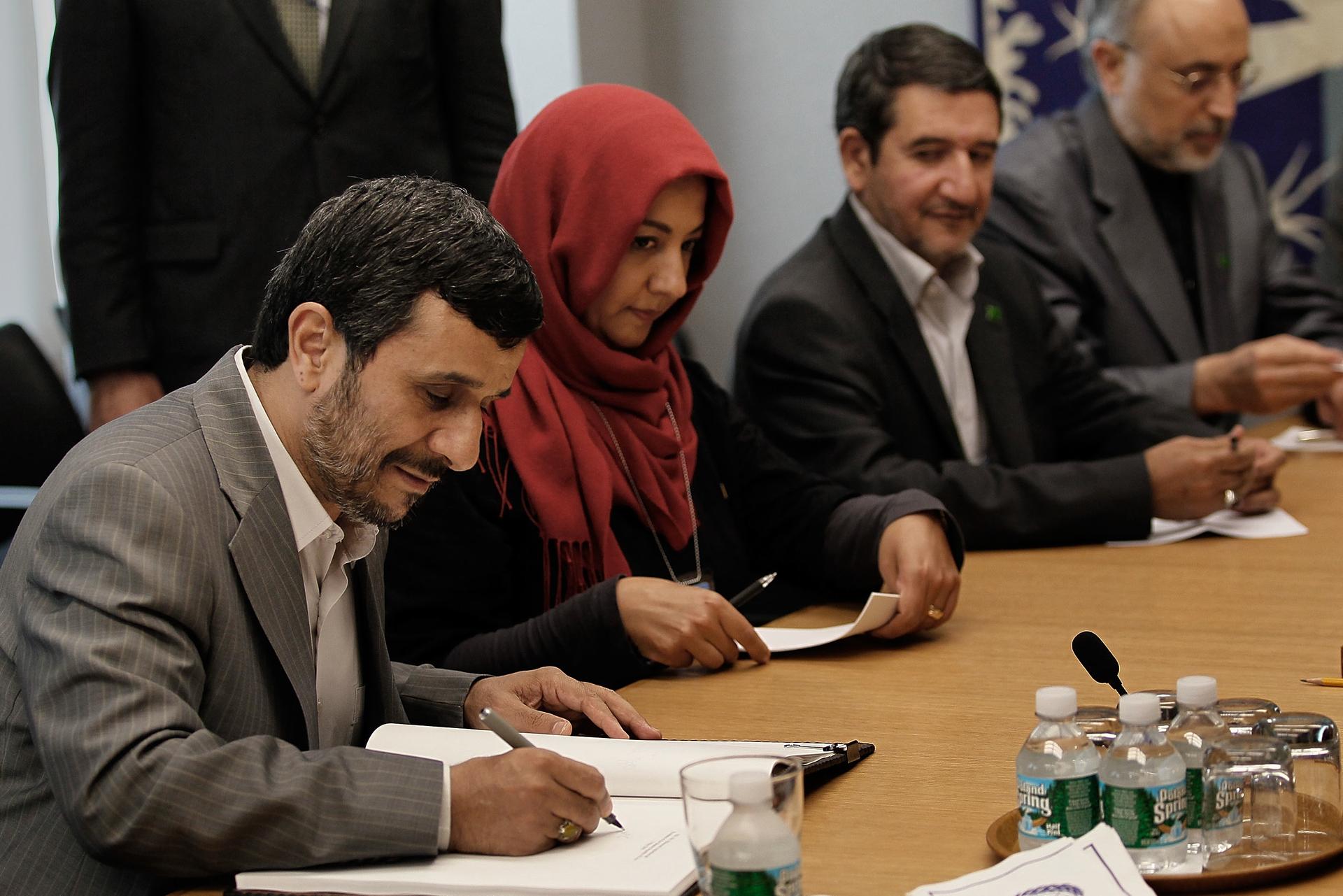Why a Middle East role is essential for the nuclear nonproliferation regime
Iranian president Mahmoud Ahmadinejad (L) during the Nuclear Non-Proliferation Treaty Review Conference in 2010.
CAMBRIDGE — The meeting of the preparatory committee (PrepCom) for the 2015 nuclear Non-Proliferation Treaty (NPT) Review Conference predictably ended in failure to lay the ground for the event earlier this month.
The core reason was the inability to convene a meeting in Helsinki last December on the establishment of a Weapons of Mass Destruction Free Zone (WMDFZ) in the Middle East.
The NPT was extended indefinitely in 1995, but is still reviewed by member states every five years. The previous Review Conference in 2010 could succeed only because a key condition for the Arab states’ agreement — a commitment to convene the WMDFZ conference by 2012 — was finally taken on board.
Against this backdrop, Egypt walked out of the Geneva meeting, after first having expressed the Arab world’s frustration over the “lack of seriousness” with which the issue had been handled by the conveners — the United States, Russia and the UK.
It is possible to dismiss the failure of the PrepCom as the latest act of an old drama that allows the non-nuclear weapon states to express their frustration but does not amount to a real threat to the nonproliferation regime.
However, one should not underestimate the potential backlash of successive failures to agree on a future agenda for nuclear arms control in the region. To quote Ambassador Thomas Graham, President Clinton’s special advisor on arms control issues: “The [NPT] will stand or fall depending on how the issue of nuclear proliferation is managed in the Middle East.”
While Graham’s view on the future of the NPT might be bit of a stretch, the latest events certainly do not promise well for the 2015 Review Conference. Although the Arab states are unlikely to follow up with the threat of withdrawing from the NPT, their discourse nevertheless downplays the legitimacy of the treaty.
Given the increased potential of radical voices to influence policies in the region, one cannot rule out the possibility that some states will ultimately turn rhetoric into action. A failed Review Conference would also do a disservice to the Obama administration’s nuclear arms control agenda.
All of this begs the question whether the obstacles for launching the WMDFZ process truly are insurmountable.
Last November, the US justified the postponement of the conference by referring to unfavorable regional circumstances. Echoing Israeli concerns, it also named “a comprehensive and durable peace” and “full compliance by all regional states with their arms control and nonproliferation obligations” as “essential precursors” for the establishment of a WMDFZ in the region.
The offered justifications veiled what were undoubtedly the most important reasons for the postponement, namely Israel’s reluctance to participate and disagreement regarding the manner of decision-making in the conference.
As the only nuclear weapon state in the Middle East, Israel is bound to feel targeted by regional calls for a WMD Free Zone. Israel’s fears are amplified by the Arab states’ insistence on the majority-vote principle, which would allow them to impose their preferences. This is the core problem behind the current gridlock.
As for the other cited challenges, they are clearly formidable, especially with respect to the longer-term process. However, they do not necessarily constitute insurmountable obstacles for the organization of the WMDFZ conference.
The goal of comprehensive peace in the region needs to be reconciled with parallel steps towards disarmament. If Iran is indeed willing to participate — as it announced last November — there is nothing to lose by including it in the regional negotiations.
In the worst case, suspicions about the Iranian nuclear program persist, and the futile war of words between Iran and Israel is taken to a new, multilateral context. In the best case, however, Iran’s participation can increase regional actors’ confidence in its intentions — a development that could also alleviate Israeli concerns and have a positive effect on the P5+1-Iran negotiations.
It goes without saying that the successful organization of the Middle Eastern conference would not immediately lead to major breakthroughs. Israel will not simply give up its nuclear arsenal. Another key state, Syria, which apparently harbors a chemical weapons arsenal, cannot meaningfully be involved in the negotiations, unless a unifying government is formed.
Nevertheless, given its significance for the success of the next NPT Review Conference, the organization of the Helsinki meeting should be a top priority. As such a meeting can only be an initial stage of a gradual, long-term process, its symbolic value should be given due appreciation.
In practice, this means a flexible agenda, in which the participants would be invited to discuss their concerns and preferences, without making concrete decisions.
This would accommodate the Arab states’ interest in launching the long overdue process and at the same time alleviate Israeli fears of being singled out. In the circumstances, it is such cautious steps that would constitute the most workable approach toward confidence building in the region.
Tytti Erästö is a Stanton Nuclear Security Postdoctoral Fellow and Sven-Eric Fikenscher is a research fellow with the International Security Program and the Project on Managing the Atom at the Belfer Center for Science and International Affairs, Harvard Kennedy School.
Every day, reporters and producers at The World are hard at work bringing you human-centered news from across the globe. But we can’t do it without you. We need your support to ensure we can continue this work for another year.
Make a gift today, and you’ll help us unlock a matching gift of $67,000!
